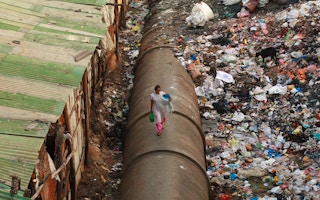Millions of homeless people and those living in informal settlements across Asia are at heightened risk of contracting the coronavirus due to their dire living conditions, housing experts said on Tuesday.
The coronavirus has infected about 180,000 people worldwide and killed more than 7,000, according to a Reuters tally.
While the data does not show how many lived in slums, the high density of settlements and meagre facilities raises their vulnerability, said Cecilia Tacoli, a researcher at the London-based International Institute for Environment and Development.
“Proximity is an important driver of infection, and low-income settlements in many cities of the Global South are very densely populated,” she told the Thomson Reuters Foundation.
“Given that new infectious diseases will likely continue to spread rapidly into and within cities, low-income settlements need more effective infrastructure,” she said.
Globally, about 1.8 billion people live in inadequate housing and homelessness, according to the United Nations.
While handwashing is a basic precaution against the coronavirus, about 40 per cent of the world’s population do not have such a facility with water and soap at home, according to UNICEF, the UN’s children’s fund.
Isolation is also hard when space is constrained and rooms are often shared, said Annie Wilkinson, a research fellow at research organisation the Institute of Development Studies.
“Slums’ informal or illegal status often undermines both the collection of data and the implementation of policies to improve health,” she said.
“There is a real risk that the impacts on the urban poor will be considerably higher than elsewhere,” she said.
“
Under the current circumstances, demolishing homes and rendering people homeless would result in increasing their vulnerability to contracting and spreading the virus.
Shivani Chaudhry, executive director, Housing and Land Rights Network
‘Alarming’
In Hong Kong, where thousands of people who have recently visited China or may have had contact with patients, are confined to their homes under quarantine orders, it is particularly risky for those who live in partitioned flats.
These units generally have poor ventilation and drainage, and residents are more vulnerable because of the shared kitchen and toilets, said Choyu Cheung, a community organiser at the Society for Community Organization, a non-profit.
“This epidemic highlights how alarming the housing situation is in Hong Kong,” Cheung said.
While the Hong Kong government has announced handouts to tackle the outbreak, some public housing has been converted into quarantine centres, thereby reducing an already constrained supply of public housing.
In South Asia, authorities have reported rising numbers of coronavirus cases.
In India, at least 4 million people are homeless in urban areas, and more than 70 million live in informal settlements, said Housing and Land Rights Network (HLRN), a non-profit.
In addition to providing emergency accommodation and healthcare services, authorities must enforce a moratorium on evictions, said Shivani Chaudhry, executive director at HLRN.
“Under the current circumstances, demolishing homes and rendering people homeless would result in increasing their vulnerability to contracting and spreading the virus,” she said.
In Delhi, city officials are sanitising homeless shelters, and providing tent shelters until the end of the month, said Bipin Rai, a member of the Delhi Urban Slum Improvement Board.
“The government is closely monitoring the needs of homeless citizens. There will be no evictions for now,” he said.
This story was published with permission from Thomson Reuters Foundation, the charitable arm of Thomson Reuters, that covers humanitarian news, climate change, resilience, women’s rights, trafficking and property rights. Visit http://news.trust.org/climate.












